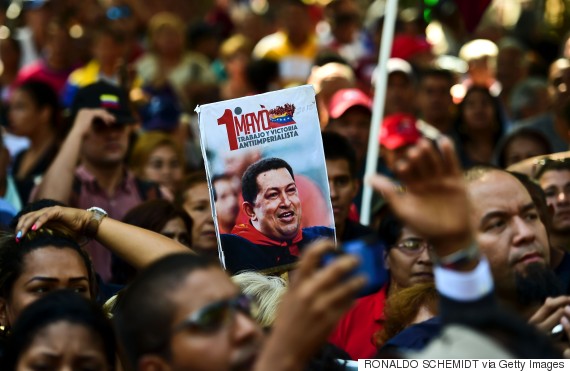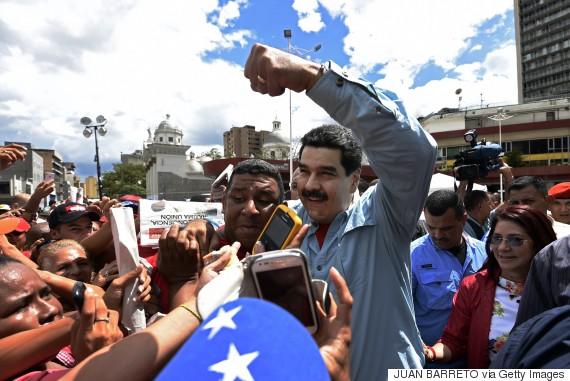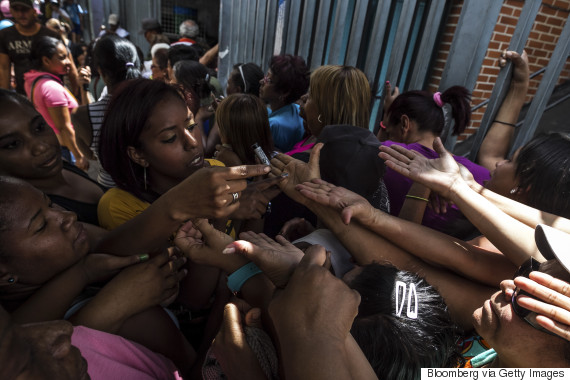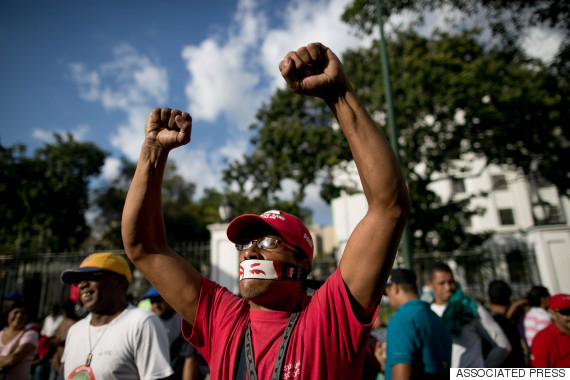
I'm having a hard time figuring out which America is real. Is it the one where Americans are protesting the killing by police officers of unarmed black boys and men? Or is it the one where TV hosts are outraged that law enforcement is under-appreciated and besieged by criminals and political correctness? Are you the America that signed the Paris climate treaty? Or the one that holds up a snowball in Congress to denounce "climate change" as a hoax? Should I believe the president's State of the Union claims that the economy is recovering at a healthy rate, or is he presiding over the slowest recovery ever, on account of his misguided policies? News in the U.S. appears in split screen: Two entirely separate realities.
This all feels depressingly familiar, having moved to Canada from Venezuela. We Venezuelans are world champions at disagreement, polarization and navigating competing narratives, and so we have been since at least 1998, when Hugo Chávez was first elected president. An entire generation doesn't know another way of living. Our polarization has not only polluted the public sphere, it has also invaded the private one, soiling relations among friends, parents, wives, husbands and children.
My beloved, fractious Venezuela, in other words, offers a cautionary tale to the United States: You don't want to keep going down this path.

Venezuelan society has become divided on almost everything, in two parallel worlds, between the Chavistas and the opposition. Each one has its own media. Currently the Chavistas dominate public-funded media while the opposition has a few newspapers and tries to reach people through YouTube and Periscope. Each of these worlds has its own separate fashions, favorite restaurants and stores, its own literary contests and book fairs, its favorite musicians. They even have separate flags: Chavistas use the one with eight stars, which Chávez's government established as official in 2006, while the opposition prefers the previous one, with seven stars. Each of those worlds has its own versions of the past, the present and the future.
The opposition narrative goes like this: Venezuela was a peaceful, egalitarian, oil-rich modern democracy until the day the ignorant poor masses elected Chávez, a thuggish army man who'd previously sought to take power by force. The lower classes, they say, are motivated by revenge and greed and easily swayed by promises of handouts and wealth redistribution. When Nicolás Maduro (who succeeded Chávez upon his death but lacks his charisma) is hauled off to jail in The Hague's International Court, the lost paradise will be rebuilt and all the emigrés will return. When things go wrong, the opposition blames Cuba.
For Chavistas, history is a long continuum featuring the massacres of the Spanish conquest, colonial slavery and the economic and political inequities of Venezuela's dictatorial and corrupt democratic governments in the 20th century. They cast Chávez in the same light as Simón Bolívar (who died in 1830) -- as a liberator from oppression. When things go wrong, Chavistas blame the United States.

Of course, neither of these sagas is true. History is not an epic war between poor saints and satanic oligarchs, as Chavistas believe, but Venezuela was never a model democracy where the poor had no reasons to complain. Many culprits contributed to the present disastrous state of affairs. We summoned our own tragedy -- not the Americans or the Cubans.
Venezuela's polarization has been exacerbated by a tradition of valuing relationships over objective truth. Colombian novelist Gabriel García Márquez summarized this when he said he found the key to magical realism, his celebrated style of storytelling: He remembered that his grandma would tell an unbelievable story with the confidence one can show when talking about a completely normal event.
Chávez didn't invent this personalization and polarization but he took it to new heights. Early on in his presidency he'd commandeer TV airwaves for hours, mixing childhood memories, popular songs and insults to his enemies. As time when on, he began inventing fanciful stories -- new interpretations of history or reality, conspiracies, assassination plots -- and repeating them. Meanwhile, he accused the opposition press of being propagandists in the tradition of Nazi Germany's notorious Joseph Goebbels, who said that if you repeated a lie often enough people would believe it.
It's no longer possible to have a decent conversation.
The vicious circle of polarization tightened and freedom of speech was severely compromised. Perhaps the strangest moment occurred early on the morning of July 16, 2010, when Chávez tried to prove that Colombia, his nemesis for much of his presidency, had assassinated Bolívar (who died of tuberculosis). Chávez went so far as to exhume Bolivar's bones on TV, and held them in his gloved hands.
The opposition responded with conspiracy theories of their own. When the president had surgery in early 2011, the opposition spread the rumor that he was very ill. But when Chávez announced he had cancer, the opposition rumor mill said he was lying to regain popularity. The fact that these paranoid fantasies contradicted each other did not deter anyone. And so when Chávez lost his hair during chemotherapy, the opposition insisted that it was all makeup. A few months later, Chávez said he was cured of cancer and able to run for reelection in the 2012 presidential campaign. Here it was the Chavistas' turn to suspend disbelief, contending he was a living miracle. Meanwhile, the Opposition, which months before insisted he was faking his illness, now said that he was about to die.
What Venezuela has now, instead of anything resembling authentic public opinion or independent media, is a chorus of desperate people trying to create an echo. With no reliable sources of information about Chávez's deteriorating health, people turned to social media, where some followed a Brazilian astrologist; others the tweets of a Florida doctor with no connection to Chávez's medical team in Havana; others a moonlighting journalist. Social networks are perfect ecosystems for collective hysteria.

As people choose to trust in tribal gossip instead of objective reporting and facts, values like moderation, reason and nuance are seen as uncool or lame. Worse, trying to say something "reasonable" is taken as a sign of weakness and even treason. It's no longer possible to have a decent conversation.
As a result, Venezuela is paralyzed. The economy is a wreck on account of so much mismanagement and plummeting oil prices. Inflation has risen to somewhere around 140 percent. In 2014, the homicide rate was second highest in the world.
But our institutions can't even attempt to resolve these problems because they are no longer on speaking terms with each other. For instance, the armed forces refuse to work with police corps that are managed by opposition governors. Recently, the opposition pulled off a surprising win in legislative elections (the surprise was that the win was recognized) and took control of the legislature, pitting the National Assembly against President Maduro in a perpetual stalemate.

After so many years of fighting, Chavistas and opposition alike are condemned to the same bleak future.
Polarization is the zeitgeist of our time, everywhere, it seems. I can see this in the news from the United States, where your two realities are moving farther apart. The gulf that divides is widened by technology. We follow people on Twitter who already think like us and Google's algorithms steer us to websites that confirm our ideas; it's getting harder to find any middle ground. And the rewards aren't there anymore -- compromise seems so passé.
But democracies need middle ground. So before you pass on that Facebook post with its snarky us-versus-them logic or let a demagogue speak for you or repeat a "fact" you know couldn't possibly be true, try to remember Venezuela's cautionary tale. You don't want your democracy to end up looking like ours.
Earlier on WorldPost:

